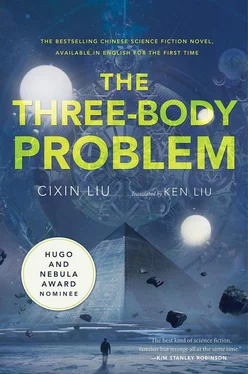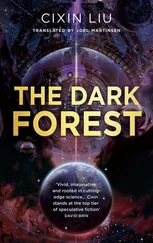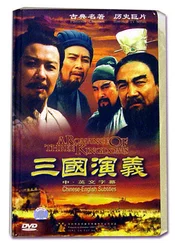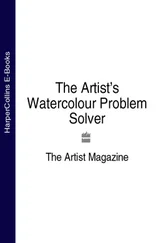Ye slowly sat down on the edge of the bed, her eyes staring at the notebook, lost in thought. Her daughter had died here, ended her life while she slept. Wang sat next to her. He had never felt such a strong desire to share the burden of another’s pain.
Ye took the birch-bark notebook from him and held it to her chest. In a low voice, she said, “I wasn’t good at teaching Dong Dong in an age-appropriate manner. I exposed her too early to some very abstract, very extreme topics. When she first expressed an interest in abstract theory, I told her that field wasn’t easy for women. She said, what about Madame Curie? I told her, Madame Curie was never really accepted as part of that field. Her success was seen as a matter of persistence and hard work, but without her, someone else would have completed her work. As a matter of fact, Wu Chien-Shiung went even further than Madame Curie. [21] Author’s Note: Chien-Shiung Wu was one of the most outstanding physicists of the modern era, with many accomplishments in experimental physics. She was the first to experimentally disprove the hypothetical “law of conservation of parity” and thereby lend support to the work of theoretical physicists Tsung-Dao Lee and Chen-Ning Yang.
But it really isn’t a woman’s field.
“Dong Dong didn’t argue with me, but I later discovered that she really was different. For example, let’s say I explained a formula to her. Other children might say, ‘What a clever formula!’ But she would say, ‘This formula is so elegant, so beautiful.’ The expression on her face was the same as when she saw a pretty wildflower.
“Her father left behind some records. She listened to all of them and finally picked something by Bach as her favorite, listening to it over and over. That was the kind of music that shouldn’t have mesmerized a kid. At first I thought she picked it on a whim, but when I asked her how she felt about the music, she said that she could see in the music a giant building, a large, complex house. Bit by bit, the giant added to the structure, and when the music was over, the house was done….”
“You were a great teacher for your daughter,” Wang said.
“No. I failed. Her world was too simple, and all she had were ethereal theories. When they collapsed, she had nothing to lean on to keep on living.”
“Professor Ye, I can’t say that I agree with you. Right now, events are happening that are beyond our imagination. It’s an unprecedented challenge to our theories about the world, and she’s not the only scientist to have stumbled down that path.”
“But she was a woman. A woman should be like water, able to flow over and around anything.”
* * *
As Wang was about to leave, he remembered the other purpose for his visit. He mentioned to Ye his wish to observe the cosmic microwave background.
“Oh, that. There are two places in China that work on it. One is an observatory in Ürümqi—I think it’s a project by the Chinese Academy of Sciences’ Space Environment Observation Center. The other is very close by, a radio astronomy observatory located in the suburbs of Beijing, which is run by the Chinese Academy of Sciences and Peking University’s Joint Center for Astrophysics. The one in Ürümqi does ground observation, and the one here just receives data from satellites, though the satellite data is more accurate and complete. I have a former student working there, and I can make a call for you.” Ye found the phone number and dialed it. The ensuing conversation seemed to go smoothly.
“You’re all set,” Ye said as she hung up. “Let me give you the address. You can go over anytime. My student’s name is Sha Ruishan, and he’s going to be working the night shift tomorrow…. I don’t think this is your field of research, right?”
“I work in nanotech. This is for… something else.” Wang was afraid that Ye was going to ask more questions about why he sought this information, but she did not.
“Xiao Wang, you look a bit pale. How’s your health?” she asked, her face full of concern.
“It’s nothing. Please don’t worry.”
“Wait a moment.” Ye took a small wooden box out of a cabinet. Wang saw from the label that it was ginseng. “An old friend from the base, a soldier, came to visit me a few days ago and brought this—take it, take it! It’s cultivated, not very precious. I have high blood pressure and can’t use it anyway. You can slice it thinly and make it into a tea. You look so pale that I’m sure you can use the enrichment. You’re still young, but you have to watch your health.”
Wang accepted the box, warmth filling his chest. His eyes moistened. It was as though his heart, stressed almost beyond the breaking point by the last few days, had been placed onto a pile of soft down feathers. “Professor Ye, I will come visit you often.”
Wang Miao drove along Jingmi Road until he was in Miyun County. From there he headed to Heilongtan, climbed up the mountain along a winding road, and arrived at the radio astronomy observatory of the Chinese Academy of Sciences’ National Astronomical Center. He saw a line of twenty-eight parabolic antenna dishes, each with a diameter of nine meters, like a row of spectacular steel plants. At the end were two tall radio telescopes with dishes fifty meters in diameter, built in 2006. As he drove closer, Wang could not help but think of the background in the picture of Ye and her daughter.
But the work of Sha Ruishan, Ye’s student, had nothing to do with these radio telescopes. Dr. Sha’s lab was mainly responsible for receiving the data transmitted from three satellites: the Cosmic Background Explorer, COBE, launched in November of 1989 and about to be retired; the Wilkinson Microwave Anisotropy Probe, WMAP, launched in 2003; and Planck, the space observatory launched by the European Space Agency in 2009.
Cosmic microwave background radiation very precisely matched the thermal black body spectrum at a temperature of 2.7255 K and was highly isotropic—meaning nearly uniform in every direction—with only tiny temperature fluctuations at the parts per million range. Sha Ruishan’s job was to create a more detailed map of the cosmic microwave background using observational data.
The lab wasn’t very big. Equipment for receiving satellite data was squeezed into the main computer room, and three terminals displayed the information sent by the three satellites.
Sha was excited to see Wang. Clearly bored with his long isolation and happy to have a visitor, he asked Wang what kind of data he wanted to see.
“I want to see the overall fluctuation in the cosmic microwave background.”
“Can you… be more specific?”
“What I mean is… I want to see the isotropic fluctuation in the overall cosmic microwave background, between one and five percent,” he said, quoting from Shen’s email.
Sha grinned. Starting at the turn of the century, the Miyun Radio Astronomy Observatory had opened itself to visitors. In order to earn some extra income, Sha often played the role of tour guide or gave lectures. This was the grin he reserved for tourists, as he had grown used to their astounding scientific illiteracy. “Mr. Wang, I take it you’re not a specialist in the field?”
“I work in nanotech.”
“Ah, makes sense. But you must have some basic understanding of the cosmic microwave background?”
“I don’t know much. I know that as the universe cooled after the big bang, the leftover ‘embers’ became the cosmic microwave background. The radiation fills the entire universe and can be observed in the centimeter wavelength range. I think it was back in the sixties when two Americans accidentally discovered the radiation when they were testing a supersensitive satellite reception antenna—”
Читать дальше












